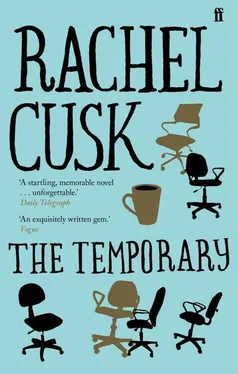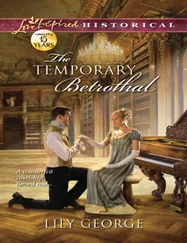Rachel Cusk - The Temporary
Здесь есть возможность читать онлайн «Rachel Cusk - The Temporary» весь текст электронной книги совершенно бесплатно (целиком полную версию без сокращений). В некоторых случаях можно слушать аудио, скачать через торрент в формате fb2 и присутствует краткое содержание. Год выпуска: 2013, Издательство: Faber & Faber, Жанр: Современная проза, на английском языке. Описание произведения, (предисловие) а так же отзывы посетителей доступны на портале библиотеки ЛибКат.
- Название:The Temporary
- Автор:
- Издательство:Faber & Faber
- Жанр:
- Год:2013
- ISBN:нет данных
- Рейтинг книги:5 / 5. Голосов: 1
-
Избранное:Добавить в избранное
- Отзывы:
-
Ваша оценка:
- 100
- 1
- 2
- 3
- 4
- 5
The Temporary: краткое содержание, описание и аннотация
Предлагаем к чтению аннотацию, описание, краткое содержание или предисловие (зависит от того, что написал сам автор книги «The Temporary»). Если вы не нашли необходимую информацию о книге — напишите в комментариях, мы постараемся отыскать её.
The Temporary — читать онлайн бесплатно полную книгу (весь текст) целиком
Ниже представлен текст книги, разбитый по страницам. Система сохранения места последней прочитанной страницы, позволяет с удобством читать онлайн бесплатно книгу «The Temporary», без необходимости каждый раз заново искать на чём Вы остановились. Поставьте закладку, и сможете в любой момент перейти на страницу, на которой закончили чтение.
Интервал:
Закладка:
He stood up and began putting on his jacket. When Francine got to her feet the room whirled, listing like a flailing ship. Her thoughts spun with it, indecipherable, but through them she felt something hard and compelling, a wire drawn tight along which she appeared to be strung. Stephen draped her coat around her shoulders and she gripped his hand as he led her through the crowded tables and up the stairs.
‘I’ll find you a cab,’ he said when they were outside. ‘Come on.’
The night had grown black and the air was piercing, agonizing. As they set off towards the busy street Francine felt the drag of failure, and the penetrating cold shrank in seconds the heady dilation of the recent hours. She felt packed again with all the lumpy, ugly furniture of anxiety which had come in the past few weeks to clutter spaces which had once been bright and empty, and trapped amongst it a searing, hopeless consciousness of the fact that things were going wrong visited her. In that moment, as Stephen walked ahead, a violent flame of resistance coursed through her and consumed it all. She would not let this happen to her! Why, when every glance in the mirror told her, when every look and gesture confirmed it, when she knew — had been told time and time again! — that she could have anything she wanted, why then was nothing as she wanted it to be? How had she come to these doomed and darkened passages, so far from the world she knew; what had happened to her magic, the arts she had practised for as long as she could remember, the spells which she had known would one day conjure success? A wave of drunkenness washed over her, and she stood still as the alley blurred in her eyes. Everything seemed all at once rather muddled. A jumble of images churned and then settled thickly on her surface. For a moment all of her was gathered and a forgotten doubt began to revive and struggle in her, beating its wings. She was sick, sick of herself.
‘Come on, Francine,’ said Stephen, waiting for her up ahead. He turned and walked back towards her. ‘You’re a bit tanked up, did you know that? Decidedly squiffy, as my dear old mother would say.’
Francine watched his mouth moving. Who was he, standing there making fun of her, talking about his mother, when he should be begging to touch her? They all wanted her — they all said it, that she was the most beautiful, the most desirable, that they would do anything for her. She hated them all, all of them! And most of all she hated Ralph, who had ruined everything and made it disgusting! Stephen was close to her now. She felt a pressure across her shoulders and realized that his arm was around her.
‘Come on,’ she whispered, turning and pressing herself against him. She felt him recoil slightly and she pressed harder.
‘Jesus,’ he said, laughing and putting his arms around her. ‘What are you doing?’
Her face was almost level with his and she lunged forward, trying to insinuate her tongue into his mouth.
‘Christ, Francine!’
He twisted his head to avoid her as a group of people came loudly out of the bar and along the street. One or two of the women giggled as they passed and a man shouted something.
‘Who cares?’ said Francine. ‘Ignore them.’
‘You’re drunk,’ said Stephen. His tone was milder now, and he ran a hand up and down her back. ‘Come on, stop it.’
‘Take me!’ she shouted. Her voice echoed along the empty alley.
‘What?’
Stephen began to laugh, but she planted herself against his open mouth and suddenly he started to kiss her violently, grabbing her hair with his fist and pulling back her head. He tugged her blouse free of her skirt with his other hand and she had a dull consciousness of pain as his teeth bit into her lips.
‘Is this what you want?’ he said viciously in her ear, turning her and forcing her against a wall. Her head banged on the cold brick. She struggled against him with surprise but his body was a cage, pinning her where she stood.
‘Stop it!’ she said, writhing against his grip as terror penetrated her drunkenness. His breath gusted warmly in her face. ‘Get off!’
As quickly as it had started the tumult stopped. The pressure of his weight fell from her, and seconds later, feeling the cold gather at her clothes, she realized he had gone. The sound of fading footsteps drifted to her ears and she turned her head to watch his dark back grow smaller as he disappeared. As if feeling her eyes, he raised his arm in a salute without turning around.
‘Bye, Francine!’ he called.
The sound of his laughter bounded back down the alley towards her and vanished. She heard the silence of the small street in the darkness, and beyond it the sound of cars passing, going somewhere far away. The wall at her back was cold and continuous. She tucked her blouse back into her skirt, drew her coat around her, and began to walk as elegantly as she was able towards the road.
Sixteen
Ralph left the Tube station and turned up Camden High Street towards home. The days were getting longer now — he could suddenly feel it, the almost imperceptibly slow arm wrestle, the gradual gain of light over dark — and the sky was still bright with the memory of sun as he walked towards the Lock. He passed the launderette and then the funeral parlour, behind whose tinted windows pale ruched curtains were lavishly bunched above a thick pink lawn of carpet, suffocating as a girl’s bedroom. Inside, a middle-aged woman stood proprietorially at the glass, peering anxiously up and down the pavement like a waiter looking for customers at the door of an empty restaurant. He walked on, surprised to feel his lips stretching with a grin.
Tentatively, running nervous fingers over his feelings, prodding his situation again with a scientist’s circumspection, he could admit that things hadn’t been so bad today. Yesterday he had felt cast out, irretrievable, doomed to patrol the border of what he could endure, and it had come as a surprise to him to wake the next morning and realize that something, if only a day, now lay between him and his catastrophe. His sense of his own survival gave way as he walked to more expansive thoughts, a feeling of having been aroused from some long dormancy, the revivification which he recognized was the residue of pain. His life echoed now, empty, filled only with the potential for beginning it again. The idea lent some enchantment to the darkening street lit gold by a putative halo of street lamps, the friendly, sleeping faces of shops, the shy eyes of passers-by violet in the dusk, even the beating of his heels and the puff of his own breath! His body seemed suddenly rather miraculous to him, the ambulant parcel of himself: he was contained, all of him, in this machine bent only on doing his bidding, this vehicle in which he could travel wherever he chose. He wondered why he had never thought of his sufficiency before, for it liberated him to consider it, drew his muscles tight and ready beneath his skin. Remembering times when he had felt as if he were dragging his punctured form about after him, or were lying opened on a table with the world performing his dissection, he resolved to think of it more often.
He reached the Lock and walked briskly over, exchanging smiles with a man coming the other way. The man looked at his watch as he passed, and before Ralph could defend himself against it the thought had flown into his head that Francine must have left the office by now, and that from this moment he didn’t know where she was. He felt a pain in his chest, a bristling of nerves beneath his skin while she moved darkly across his thoughts, the light in her belly bobbing as she walked. All day he had been rehearsing arguments against such moments, but when it came to using them he suddenly found himself unable to remember how they worked: he groped for their analgesic while misery grated back and forth at his heart like a saw. He strained to be home, directing his legs to go faster, imagining the rooms of his flat, his possessions homesick for him, his fridge offering itself to his hungry fingers. He saw himself watching television later, warm and alone, laughing at something funny, the telephone ringing perhaps. What was she doing now? Where was she going, with his stolen property? There in the street he shrugged, irritated, and let a sigh escape his lips. He had to stop indulging himself like that. It would spoil him, like a child, inflame his emotions. The baby had seemed so separate that night — so distinct that he had thought he could just break it off and keep it! — but now that it had receded back into the tangled ropes of her body, an inextricable, futile thing, he knew that he must sever himself or be dragged stomach down after it. He remembered his flashes of hallucination, saw again the terrible images he had harboured of harming her, until his head ached with them. He reached his turning and heard his heels clop loudly like hoofs in the sudden quiet of the small street. What would it have been like? Who would it have become? He had thought that before, hundreds of times already in only a couple of days. Of course, it was always himself he saw, never her; himself going through life again, except knowing the road now, with all that had been wrong put right. It dogged him like a little ghost, and he wondered if it always would, would walk beside him through all its ethereal ages. He checked himself again, walking faster now with the naked trees flying by him in a rush. If such a thing could live, it would only be as the product of his own invention. It was nothing, less than nothing, a loveless clot of bad blood, just something he had done, like other things, not a miracle but a mistake. It had the consistency of an idea, and he could refute it. He could choose, really, not to care about it at all, switch off feelings like lights in a house. He would have a bath and then cook dinner. He saw himself reading the paper while he ate.
Читать дальшеИнтервал:
Закладка:
Похожие книги на «The Temporary»
Представляем Вашему вниманию похожие книги на «The Temporary» списком для выбора. Мы отобрали схожую по названию и смыслу литературу в надежде предоставить читателям больше вариантов отыскать новые, интересные, ещё непрочитанные произведения.
Обсуждение, отзывы о книге «The Temporary» и просто собственные мнения читателей. Оставьте ваши комментарии, напишите, что Вы думаете о произведении, его смысле или главных героях. Укажите что конкретно понравилось, а что нет, и почему Вы так считаете.












